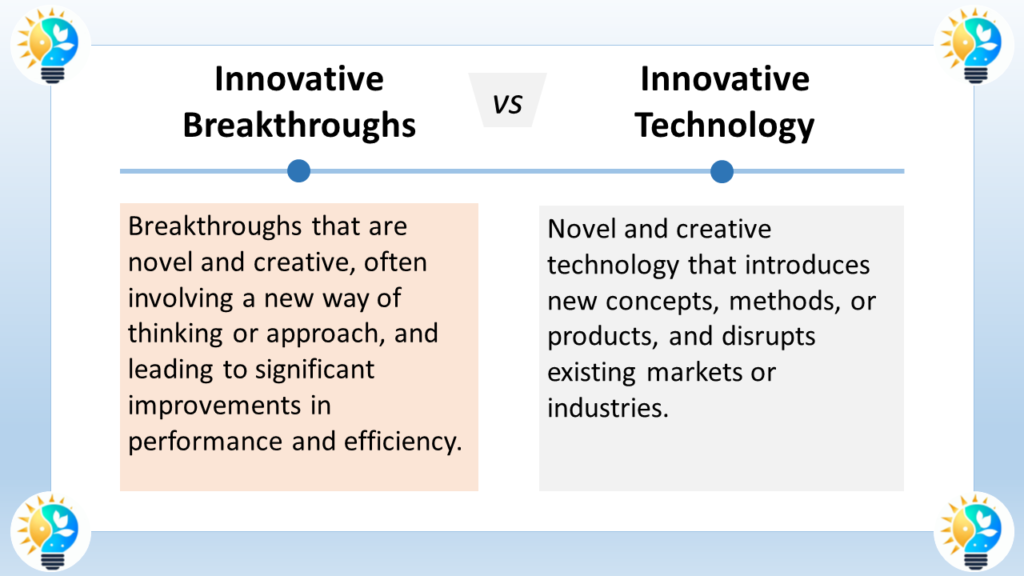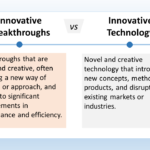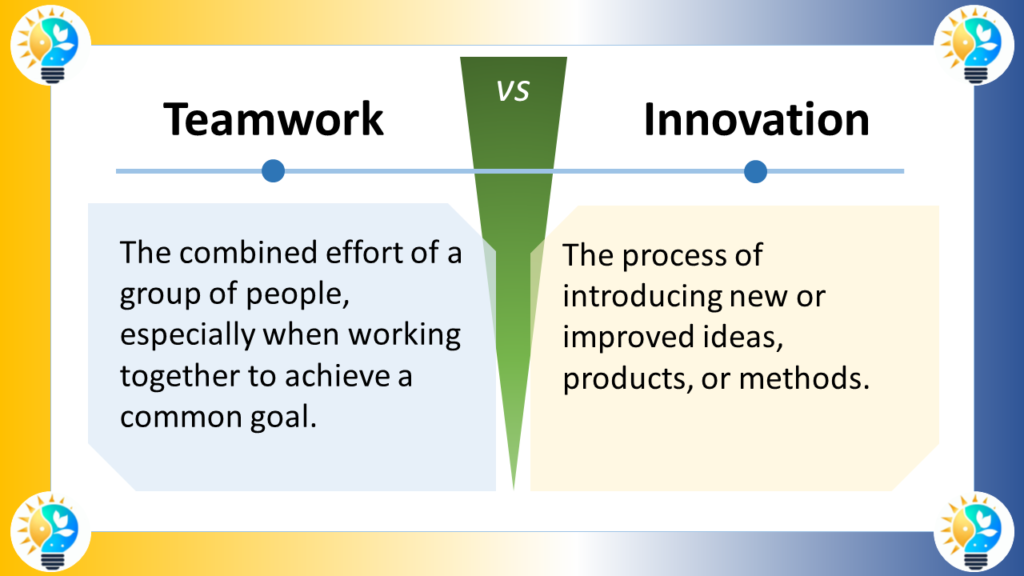Both innovative breakthroughs and innovative technology drive improvements, but while innovative breakthroughs signify creative advancements, innovative technology actively introduces novel concepts or products to achieve efficiency gains.

In the fast-paced world of technological advancement, the terms Innovative Technology and Innovative Breakthroughs are often used to describe the strides made in various fields. Although they might sound similar, they refer to different kinds of progress and achievements within the realm of innovation.
Definitions
Defining Innovative Technology
Innovative Technology encompasses new or improved technology that introduces changes or enhancements to existing products, services, or processes. It doesn’t necessarily have to be revolutionary but must offer a notable improvement or a new way of solving a problem.
Characteristics of Innovative Technology
- Enhancement: Builds upon existing technology to make it better or more efficient.
- Implementation: Can be quickly integrated into current systems or workflows.
- Market readiness: Often developed with a clear path to commercialization and user adoption.
Defining Innovative Breakthroughs
Innovative Breakthroughs, in contrast, are significant discoveries or developments that change the fundamental understanding of a field or lead to the creation of entirely new paradigms or technologies. These breakthroughs can result in unprecedented opportunities and shift the trajectory of technological advancement.
Characteristics of Innovative Breakthroughs
- Revolutionary: Offers a radical change or a novel approach that sets it apart from incremental innovation.
- Impact: Has the potential to influence multiple domains or sectors profoundly.
- Transformation: Can redefine and transform existing markets or create entirely new ones.
Exploring a Variety of Synonyms for Innovative Technology
- Advanced Technology
- Cutting-Edge Innovations
- Cutting-Edge Breakthroughs
- Disruptive Tech
- Emerging Technologies
- Forward-Looking Tech
- Futuristic Innovations
- Groundbreaking Developments
- High-Tech Breakthroughs
- Innovative Breakthroughs
- Inventive Solutions
- Leading-Edge Advancements
- Modern Technological Breakthroughs
- Progressive Advancements
- Next-Generation Technology
- Novel Tech
- Revolutionary Tech
- State-of-the-Art Solutions
- State-of-the-Art Innovations
- Trailblazing Innovations
- Visionary Tech

Innovation is considered as a driving force in progress.
It includes the introduction of novel ideas, methods, or products that bring positive change and advancement.
For more information about innovations, check our glossary
Innovative Technology vs. Innovative Breakthroughs: Relationship and Relevance
While innovative technology often represents an evolution in a particular area, addressing immediate issues or market gaps, innovative breakthroughs are seen as revolutionary, altering the course of technology in a more dramatic and comprehensive way. Breakthroughs can stem from innovative technologies when they lead to unforeseen capabilities or applications that fundamentally alter how we approach a problem or an entire industry.
Contextual Use of the Terms
Companies typically invest in innovative technology to refine their product offerings and maintain a competitive edge. On the other hand, innovative breakthroughs often require more significant investment and risk-taking but can lead to establishing leadership in new markets and can sometimes spawn entirely new industries.
Examples of Utilization
An example of innovative technology might be OLED displays in smartphones. These displays offer better picture quality and power efficiency compared to their LCD counterparts and represent a significant improvement in mobile device design and functionality.
Conversely, the development of CRISPR-Cas9 gene-editing technology is an example of an innovative breakthrough. It has changed the landscape of genetic research, with broad implications for medicine, agriculture, and beyond, by allowing precise and relatively easy modification of DNA.
Comparison Innovative Technology vs Innovative Breakthroughs
Innovative Technology and Innovative Breakthroughs are two distinct concepts that are often used interchangeably but have different meanings. Here is a breakdown of the differences between the two:
- Definition:
- Innovative Technology: Innovative technology refers to the development and application of new or improved technologies, tools, or methods that bring about advancements in various fields [2].
- Innovative Breakthroughs: Innovative breakthroughs, on the other hand, are significant advancements or discoveries that introduce entirely new products, services, or ideas that revolutionize industries or society as a whole [1].
- Focus:
- Innovative Technology: The focus of innovative technology is on improving existing processes, products, or services by leveraging new technologies or making incremental advancements [2].
- Innovative Breakthroughs: Innovative breakthroughs, on the other hand, are centered around creating something entirely new and disruptive that changes the way things are done or perceived [1].
- Scope:
- Innovative Technology: Innovative technology can be applied to various aspects of business, such as improving efficiency, enhancing user experience, or streamlining operations [2].
- Innovative Breakthroughs: Innovative breakthroughs have a broader scope and can have a transformative impact on entire industries or society, leading to significant changes in behavior, markets, and economies [1].
- Frequency:
- Innovative Technology: Innovative technology advancements occur more frequently and are often driven by continuous research, development, and improvement of existing technologies [2].
- Innovative Breakthroughs: Innovative breakthroughs are relatively rare and occur when a completely new and groundbreaking idea or invention emerges, often disrupting existing norms and creating new markets [1].
- Impact:
- Innovative Technology: Innovative technology can have a significant impact on businesses by improving efficiency, productivity, and competitiveness, but the impact is usually more localized [2].
- Innovative Breakthroughs: Innovative breakthroughs have the potential to create widespread impact, transforming industries, and even society as a whole, by introducing new possibilities and changing the way people live, work, and interact [1].
In summary, innovative technology focuses on incremental improvements and advancements in existing processes, products, or services, while innovative breakthroughs involve the creation of entirely new and disruptive ideas, products, or services that have a transformative impact on industries or society.
FAQ
Q: Are innovative breakthroughs always based on technology?
A: While many are rooted in technological advancements, some innovative breakthroughs can also occur in methodologies, materials, or scientific understanding.
Q: How do innovative breakthroughs contribute to economic growth?
A: They can drive the creation of new markets, improve efficiency, and lead to the development of new products and services, contributing to economic diversification and growth.
Q: Can an innovative technology evolve into an innovative breakthrough?
A: Yes, as an innovative technology matures and its applications expand, it can lead to unexpected uses or capabilities that constitute a breakthrough.
Q: How can companies prepare for innovative breakthroughs?
A: Companies can foster a culture of innovation, invest in research and development, and stay attuned to emerging trends to position themselves to either create or quickly adapt to innovative breakthroughs.
Q: What role do consumers play in the adoption of innovative technologies and breakthroughs?
A: Consumer adoption is critical for the success of both innovative technologies and breakthroughs, as market demand often drives the scale and direction of their development and refinement.


